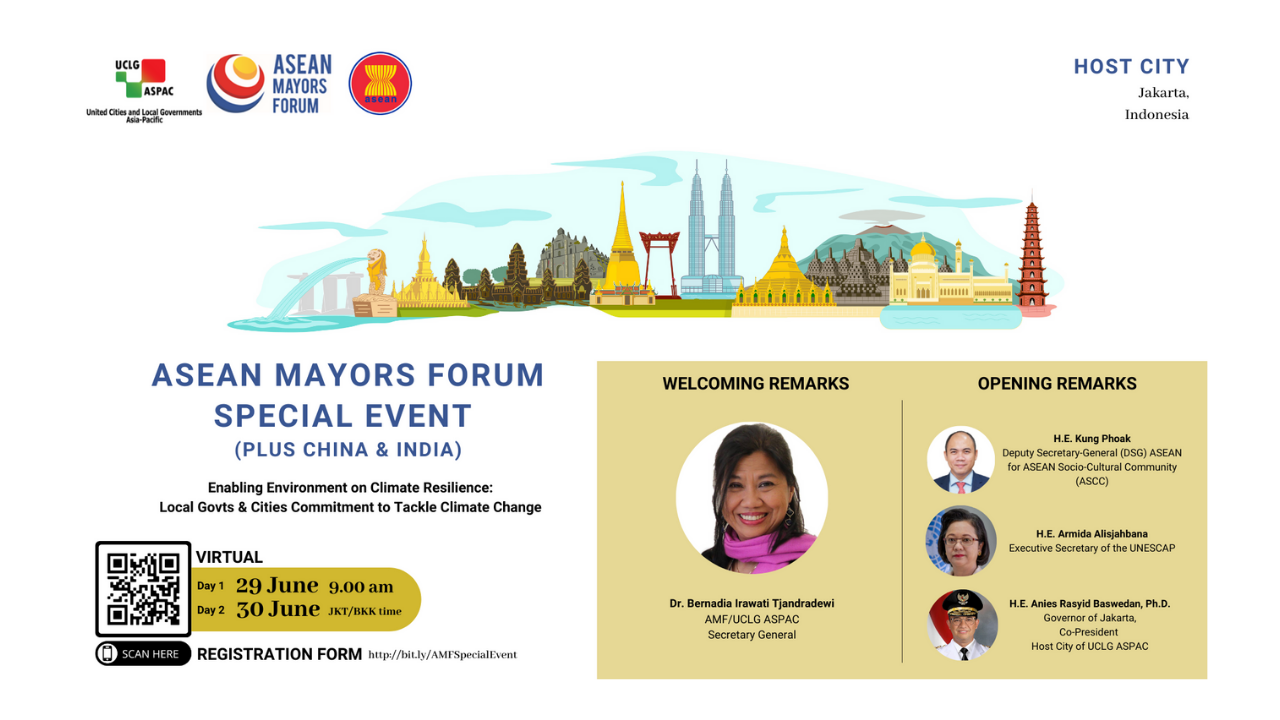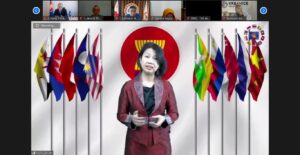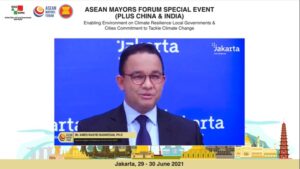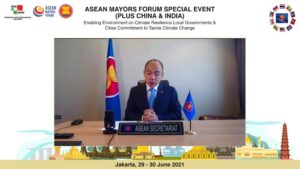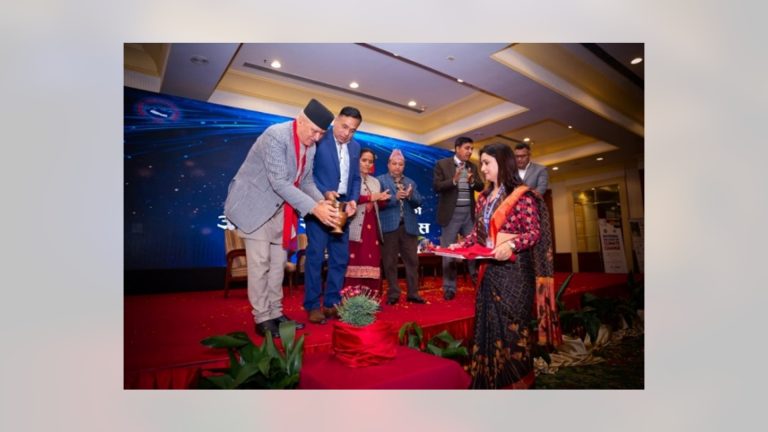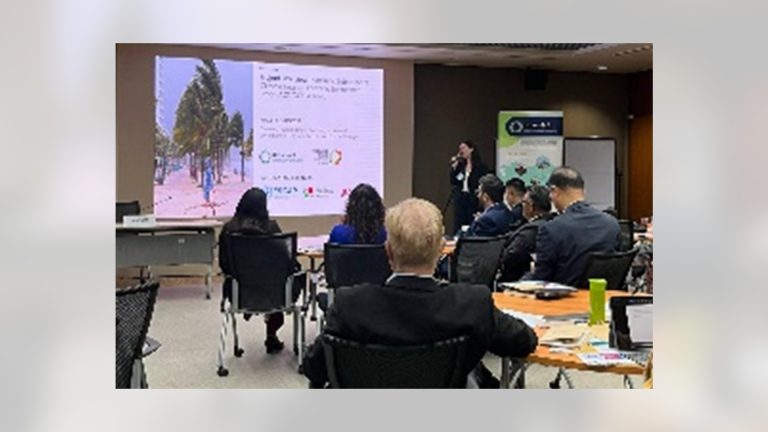As ASEAN Mayors Forum Secretariat, the United Cities and Local Governments Asia Pacific (UCLG ASPAC) organised the virtual event for two days straight under the theme of “Enabling Environment on Climate Resilience: Local Governments and Cities Commitment to Tackle Climate Change”.
Seizing the commonness of local interests on sustainable urbanisation, multiple mayors and other representatives assembled at this event to set out on a collaborative commitment. Dr. Bernadia Irawati Tjandradewi, Secretary General of AMF Secretariat and UCLG ASPAC, opened the event in the hope of fruitful interaction among the senior local government officials.
Taking place in the capital city of Indonesia, the Governor of Jakarta, Mr. Anies Rasyid Baswedan, Ph.D., welcomed the panelists and the participants with a kindred hope as the Co-President as well as the Host City of UCLG ASPAC. “Cities have a great role in tackling the impacts of climate change, to provide a liveable living environment for its inhabitants.” Mr. Anies Baswedan stated that cooperation is not only a formality, but it is critical for the local government’s role in the world in the future. Moreover, he also said that vertical and horizontal integration in action and policies matter. Collaborate with other parties, Jakarta committed to tackle climate change, reduce GHG Emission, and create more public space.
Subsequently, Ms. Armida Alisjahbana as the Executive Secretary of the United Nations Economic and Social Commission for Asia and the Pacific (UNESCAP) and H.E. Kung Phoak as the Deputy Secretary-General (DSG) ASEAN for ASEAN Socio-Cultural Community (ASCC) shared their warmth for better cooperation, coordination and integration in the region between cities and national institutions.
Ms. Armida Alisjahbana stated that South-east Asia is a vulnerable country to climate change. “The Paris Agreement requires action across levels of government. As local communities and the National government develop covid-19 recovery strategies, it is time to accelerate this action to be more resilient and greener. No local or national government should act alone, vertical integration of policies is critical. The role of cities must be well defined.”
The Deputy Secretary-General (DSG) ASEAN for ASEAN Socio-Cultural Community (ASCC), H.E. Kung Phoak mentioned the fast expansion and exponential development of mega-cities in Southeast Asia has resulted in significant environmental consequences. He stated that ASEAN has seen remarkable progress in these targets, especially through the work spearheaded by the ASEAN Working Group on Environmentally Sustainable Cities, particularly in two priority programmes on Sustainable Urban Planning, Development, and Implementation and Increasing Climate Resilient and Low Carbon Cities. “Today’s forum serves as a window of opportunity to take stock and learn from each other’s experience in climate-proofing our cities and he hopes that this gathering will also allow us to reflect on possible avenues for cooperation as we champion climate-smart cities in ASEAN,” he said.
There were four sessions held throughout two days of the AMF Special Event. The first three sessions emerged to call forth the issue of climate sensitive urban development. During the Plenary Session, a small group of panelists had their solidarity arrived on a better enabling environment for cities to conduct climate action, such as capacity building for local governments, and it was moderated by Gita Syahrani, Head of Secretariat of Lingkar Temu Kabupaten Lestari (LTKL).
These panelists were Dr. Medrilzam, Director for Environmental Affairs of the Ministry of Planning (Bappenas) from Indonesia, Mr. Jarurot Phooprasert, Expert on Architectural Planning, Department of Public Works, Town & Country Planning (DPT) from Thailand, and Mr. Epimaco V. Densing III, Undersecretary of the interior & local government of the Department of the Interior and Local Government (DILG) from the Philippines. There is also an emphasis on how increasing climate resilience could also go hand-in-hand with efforts in disaster risk reduction; particularly many mega-cities in the ASEAN are vulnerable to climate-change induced disasters
Both Session 1A and Session 1B became the sessions for mayors to come together on discussing the importance of vertical integration among governments in the region, as it can positively impact people’s lives. For example, Mayor Madelaine Alfelor as Mayor of Iriga City, Philippines, where with the right awareness, and capacity building, good climate governance can build resilience and also capacities for people at the local level, by involving communities to handle local climate and environmental concerns. Besides serving as a platform for sharing best practices along with the challenges during the implementations, these sessions displayed how local governments tapped into international climate action frameworks or agendas designed by non-state and non-governmental actors
These international frameworks consist of Climate Paris Agreement, Race to Zero campaigns on GHG emission reduction, Sendai Framework, as well as the Sustainable Development Goals (SDGs). In several cases, the aspects of these different international frameworks or agendas were tied together to meet the challenges and to attain the solutions on the matters of sustainable development and disaster risk reduction for climate action.
Mr. Huang Dingxi, Professorate Senior Planner of Guangzhou Urban Planning Association embraced the interconnectedness of all SDGs targets for the city’s development when it comes to increasing climate resilience. This included providing more public open green spaces, integrated waste management system, and many more. Furthermore, Mayor Bima Arya Sugiarto as Mayor of Bogor City, reminded speakers and participants that efforts in establishing policies and regulations on climate resilience will be most effective when they are based on accurate data.
The last session invited Mr.Curt Garrigan as the Chief of the Sustainable Urban Development Section Environment and Development Division of the UNESCAP, Ms. Melissa Elsa P. Cruz as the Chief Advisor South South Collaboration on Climate Information & Services of the GIZ GmbH from GIZ Office Manila, and Rika Zikriyyah as the Head of Communication & Marketing Unit of Jakarta Smart City.
The issue discussed in the last session was low-carbon and resilient cities. Committed to tackling climate change, the UNESCAP accumulated policy, planning, action, finance, and knowledge to ease the flow of implementation while the GIZ Manila insisted on human settlement and urban development to go hand in hand.
As the host city of the event, collaboration was the main keyword for Jakarta Smart City to approach development in general, especially during the current health and economic crises. Nevertheless, the problems that arose out of these crises brought opportunities of digital-life breakthrough and a greener environment.
In conclusion, the event succeeded to be the platform for numerous stakeholders to present cases and put consideration over cases from countries other than their own. Furthermore, it is important for other similar events to explore research-based interaction or peer-to-peer learning in addition to examples of best practices.
By KM Team








